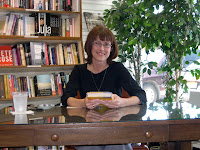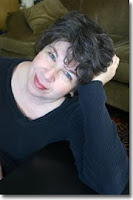352 pages
Published September 2010 by Norton, W. W. and Company
Source: bought it at The Bookworm and had it signed!
When Miss Grace Spivey arrives in Threestep, Georgia in 1939 to teach in the one-room classroom, she turns the small town on it's head. She's got a world view and the opinion that blacks are the equals of whites and every bit as entitled to a good education as any of the white children in her school. Gladys Cailiff, our eleven-year-old narrator for most of the book, takes an immediate liking to Miss Spivey and the Miss Spivey takes an immediate liking to all of the Cailiffs, including Gladys's brother's Ralphord and Force and sisters May and Ildred.
Threestep is indeed remote and forgotten. "In 1938, a lot of folks in Piedmont County were still pretty much in awe of the miracle of the airwaves." Miss Spivey's introduces the children to The Thousand Nights and A Night, reading the children the Sir Richard Burton's translation after the local library proved to only have a children's picture book version."Two year later, she [Miss Spivey] told a cheery blue-suited woman from the WPA that she wanted to bring democracy and education to the poorest, darkest, most remote and forgotten corner of America.They sent her to Threestep, Georgia."
"Miss Spivey proceeded immediately to the "A" drawer herself to look for another edition of The Arabian Nights, but there was only the one. "A children's picture book!" she said then, sounding so put out that Miss Eunice Spears [the librarian] hurried over to assure her that, despite the turbans and all, there was nothing offensive or inappropriate for children in the book. She had made certain of that."Everyone becomes engrossed in the stories, especially Miss Spivey, who soon decides the spring festival the school usually puts on will now become an Arabian Nights celebration, complete with camels. Before long, the entire county becomes involved, although convincing the church leaders took some doing; after all, the people in the stories were "heathens." School is almost entirely devoted to the creation of costumes, the making of sets and the practicing of parts. But the involvement of the black people has the local Ku Klux Klan leader on edge and the entire celebration sets off a chain of events that will forever change the lives of everyone in Threestep.
In The Cailiffs of Baghdad, George, Stefaniak as created her own version of The Thousand Nights And A Night, crafting a story withing a story within story, taking the reader from 1939 Georgia back in time to 1775 Baghdad, Iraq and 1864 Savannah, Georgia. She creates a Southern tale so spot on that it's hard to believe that this is a writer who was born in Milwaukee and now splits her time between Omaha and Iowa City. Stefaniak's mother is from Georgia and when I heard her speak last summer, she credited that family with much of the inspiration for this book.
In Gladys, Stefaniak has given the reader a delightful voice and captured that innocence and awe that only found in a child of that age. The book is filled with interesting, believable characters including Theo Boykin, the smartest person in the county who also happens to be black and Uncle Mack, the camel man. Stefaniak manages to touch on a number of themes including racism, religion, and big business vs. landowners. While the story stayed in 1939 Georgia, I was rapt. In the last third of the book, Stefaniak travels back in time, spending a long period away from Threestep. While this part of the book was certainly interesting, I found myself losing track of the original story and getting lost in all of the new characters. Overall, though, I found the book delightful, often nodding my head or chuckling. Publisher's Weekly and Kirkus Reviews both called the book "engaging" and I would have to agree.
 |
| Stefaniak signing books at Omaha's The Bookworm |
To learn more about Steniak and her other books, including The Turk and My Mother, visit her website.
This wraps up my month dedicated to Omaha authors, although I've noticeably left out mystery/thriller writer Alex Kava (completely unintentionally!). I'll write more about her soon. In looking at Stefaniak's website, I see that the Nebraska Book Festival is coming up in May. I didn't even know such a thing existed! Unfortunately, I'm planning to be out of town that weekend but if my plans change, you know I'll be traveling to Lincoln instead to attend the Festival.






























